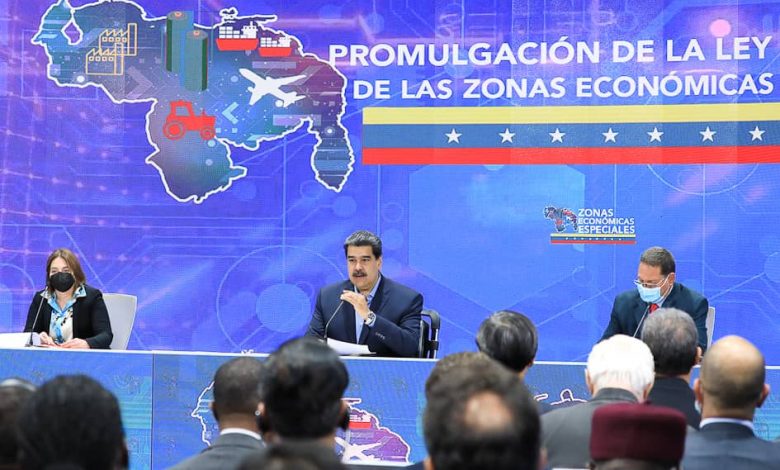
President Nicolás Maduro during the ceremony to put forward the Special Economic Zones Law, Caracas, July 20, 2022. Photo: Presidential Press.

Orinoco Tribune – News and opinion pieces about Venezuela and beyond
From Venezuela and made by Venezuelan Chavistas

President Nicolás Maduro during the ceremony to put forward the Special Economic Zones Law, Caracas, July 20, 2022. Photo: Presidential Press.
This Wednesday, July 20, the president of Venezuela, Nicolás Maduro, enacted the Organic Law of Special Economic Zones (LOZEE), a legal tool approved by the Venezuelan National Assembly (AN) to promote productive development in defined areas providing special incentives for economic development.
“The Organic Law of the Special Economic Zones has undergone an intense debate within the National Assembly with proposals, modifications, additions for final approval, and which has been the subject of a large national consultation,” he said from the International Center for Productive Investment (CIIP), located in Caracas.
He indicated that the law will build new territorial and regional economic engines based on the “growth of the productive, real economy, in order to provide material conditions for economic confidence to the investors that come.”
“Venezuela takes and resumes a new impulse in the path of the construction of special economic zones, as a path for the promotion of the productive zones of our country, for the productive path, which leads to a high development of trade for our country,” he added.
President Maduro stated that these zones will boost industrial development, contribute to the economic recovery process and promote investment.
“I congratulate all the productive sectors and I call them to work. There is only one objective: peace and development in Venezuela,” he stressed.
RELATED CONTENT: What Does the UBER Scandal Have to Do With Venezuelan Special Economic Zones?
Five zones
During the ceremony—in which governors, deputies and ambassadors from several countries participated—the Venezuelan president announced the creation of the first five special economic zones.
These zones were defined as follows:
• Paraguaná, Falcón state
• Puerto Cabello-Morón, Carabobo state
• La Guaira, La Guaira state
• Margarita (Nueva Esparta state)
• La Tortuga Island (Turtle Island), special insular zone
“I am not exaggerating when I tell you that the Turtle Island project is the largest and most important tourism project in the Caribbean and the world today,” he said.
The president stressed that it is the “most important virgin ecological project in the entire world,” for which he invited investors from all over the world to join.
After highlighting the experiences with special incentive zones in countries like China, Maduro urged the development of special economic zones with a “Venezuelan seal.”
“They have to be areas with a high component of scientific and technological investment and development; it is what guarantees us a transition into the future,” he said.
He announced that the activation of other special economic zones in several states is under study .
Creation of Superintendency
President Maduro also announced the creation of the Superintendency of Special Economic Zones, the institution that will supervise and exercise leadership over these territorial production spaces.
RELATED CONTENT: Special Economic Zones: Why Venezuela Relies on Them to Attract Foreign Investment
“I announce that I have signed the decree, which must appear in the Official Gazette, creating the Superintendency of Special Economic Zones, which will be the institution that will have the rectory, command (…) of the economic zones,” he said.
He insisted that the LOZEE came “at the right time,” after highlighting that Venezuela is going through a process of economic growth.
“When the economic growth figures that Venezuela has are known, the world is going to tremble. Venezuela has returned to the game of economic growth. We have come back back on top, bigger,” he added.
Credibility building
Deputy Jesús Faría, president of the Parliament’s Permanent Commission on Economy, said that the implementation of these zones will serve to “consolidate confidence and credibility in the country.”
He stressed that the LOZEE was widely discussed by all economic, social and political actors.
“We are pleased with the enormous consensus that has been agreed upon with this law that will serve to continue consolidating confidence in the country,” added the deputy, who also highlighted the contributions that the law will leave in terms of wages and job creation.
In this particular area many Chavista economists and analysts have expressed their concern about conditions that might further deteriorate the precarious wage levels endured by millions of Venezuelans as a direct consequence of the US and European blockade and illegal sanctions.
Faría said that Venezuela is projected “very strongly and as a valid option for investment,” after highlighting the progress it had made on a recent tour to South Africa.
The draft Law on Special Economic Zones was presented in April last year by the Finance Commission of the AN, and approved on June 30 of this year by a qualified majority.
The special economic zones are defined geographic areas that are intended for productive development, characterized by fiscal, customs, tax incentives and other incentives. They plan to diversify the economic apparatus and attract domestic and foreign investment.
In general, the economic zones prioritize scientific and technological, industrial and agri-food development.
(Últimas Noticias) by Robert Araujo, with Orinoco Tribune content
Translation: Orinoco Tribune
OT/JRE/DD/EF